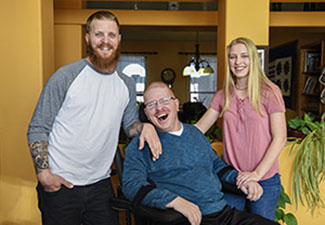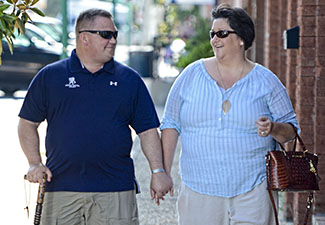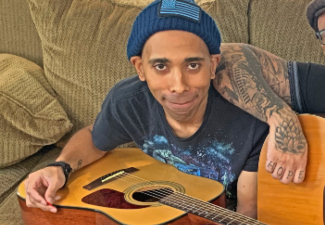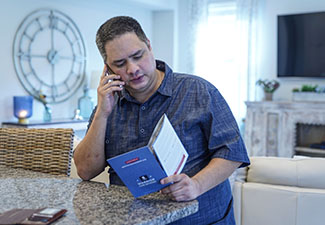Brush with Hope: Devastating Injury Fails to Silence Army Veteran’s Creative Spirit

Ever since he was a little kid, Brian Zreliak loved putting the images in his mind onto paper. He didn’t need words to express himself, just some color and his imagination.
“Brian’s been drawing since he was 3 years old,” his mother, Nancy Zreliak, said. “He won his first coloring contest when he was 3 or 4, and it was in an older group.”
Brian’s love of art continued. He graduated from the Pittsburgh Art Institute with a desire to work in computer animation. But in 2003, Brian felt compelled to do more and wanted to serve his country, so he joined the Army.
“He really liked [being in the Army],” Nancy said.
Brian was stationed in Alaska. He received orders that his unit would deploy to Iraq in 2005.
“I was so nervous. I didn’t want him to go,” Nancy said.
Before he left for Iraq, Brian visited his family back home in Hermitage, Pennsylvania. Little did they know it would be the last time they saw Brian as a healthy young soldier.
But the war in Iraq didn’t turn out to be Brian’s biggest battle. A devastating accident on the desolate Alaskan highway resulted in several severe injuries, altering Brian’s ability to speak, remember, and move his legs and arms.
Serving our nation’s most severely wounded warriors, including those with significant brain injuries, is the purpose of the Wounded Warrior Project® (WWP) Independence Program. The life-changing programs and services offered by WWP™ support warriors like Brian and caregivers like Nancy never feel alone on their journeys to recovery.
A Life-Altering Accident
Brian returned to Alaska in July 2005 after visiting his family, ready to return to his post and prepare for his upcoming deployment. The commute from the airport to Brian’s duty station was six hours. A fellow soldier and his wife picked Brian up from the airport, and Brian used the long commute back to take a nap in the backseat of the SUV.

Brian Zreliak was preparing to deploy to Iraq when he was wounded in a car accident on the way back to his Army post in Alaska.
Not long before reaching their destination, the driver lost control of the vehicle, causing the SUV to roll multiple times along the remote stretch of road. The impact ejected Brian from the car.
“They couldn’t even find him at first,” Nancy said. “The only window that was broken was the one he went through. He was thrown 80 feet from the vehicle, and his head hit the pavement.”
Nancy, Brian Sr., and Brian’s younger sister, Danielle, received the devasting news that Brian might not survive the accident.
“They told us he only has about an hour to live, so you better hurry up and get here,” Nancy said. “We can’t even get to Pittsburgh in an hour.”
The Zreliaks rushed to get to Alaska and did the only thing they could do in the meantime as they waited on word of his condition — pray.
After three plane rides, they arrived at the hospital to find Brian in a coma, still hanging on, but his condition was dire.
“He had a bolt in his head because they had to drain the fluid,” Nancy said. “I remember the doctor coming in and saying even if he makes it, he’s probably going to be in a [vegetative state].”
The Zreliaks were in Alaska for three months as Brian was being treated and stabilized at the hospital. During that time, Brian went through other obstacles, including a perforated diaphragm that required surgery. He was also unable to speak, leaving him unable to communicate his needs or pain. But Brian kept fighting.
“I had three books of journals that I wrote in every day, and I realize how much God was there when I reread them and remember all the stuff he went through,” Nancy said.
After those three months in Alaska, Brian transferred to a veterans hospital in Virginia, where he spent another three months. Doctors recommended placing him in a nursing home for long-term care — but Nancy wouldn’t hear of it.
“Absolutely not,” Nancy’s responded. “He’s coming home if we have to carry him.".
Home for the Holidays – and a New Way of Life
Brian returned home to his family just in time for Christmas. Before his arrival, Danielle decorated the house with lots of twinkling lights.
“He just looked around, and it was so funny because he had this look on his face,” Nancy said. “And I thought, ‘Oh my goodness, he’s smiling.’ Brian never smiled at the hospital; he was just blank. That was the first step where we knew that he knew he was home, and it felt good. That started the journey.”
At the beginning of the journey, Nancy stayed with Brian 24 hours a day, always hopeful the Brian she once knew would return. Coming home helped, but it was just the first step in a long journey of unknowns.
“We always believed it was just going to be short-term. It’s hard to believe in July (2025), it will be 20 years,” Nancy said.
One of the most difficult times, though, was watching Brian struggle to come to terms with his changed body and mind.
“I could tell he was trapped,” Nancy said. “He knew what he wanted to do, he just couldn’t do it. When he would try to move his thumb, he would sweat profusely each time. It was such a horrible thing because he was probably thinking, ‘I’m in here,’ and I can’t get out.”
Without realizing it at the time, Nancy had also become trapped. She was juggling the responsibilities of Brian’s care, dealing with a lack of sleep, and frustrated with not understanding what Brian was feeling.
“He would go through these screaming spells and get very upset, but he couldn’t tell me what was wrong,” Nancy said. “For a mother, that just breaks your heart.”
During one of his spells, Nancy recalls sitting in a rocking chair and singing This Little Light of Mine over and over.
“If you would have come in at that moment, you’d think, ‘she just lost it,’” Nancy said.
Brian Sr. decided to leave his job to help care for his son and give Nancy some much-needed breaks.
“I’ll tell you one thing, we were the best people to work together with my son,” Nancy said. “When I couldn’t deal with something, he’d take over, and when he couldn’t deal with something, I’d take over. We knew Brian best, and it just worked out perfectly.”
Asking for – and Getting – a Sign of Hope
The Zreliaks worked as a team. Nancy held onto hope that Brian would regain the abilities he’d lost, but some days were harder than others. She often prayed for a sign — something to show her what the future held.

Some of Brian's artwork.
Nancy remembers thinking at one point, if she was going to write a book about her experiences, she’d title it Silent Cry because so much of her pain, hope, and faith was expressed quietly, without words, much like Brian’s own struggles.
Through relentless effort and the support of specialists, Brian began to speak more and improve his mobility. Though he still couldn’t express himself fully, each word was progress. Memory issues complicated things, as thoughts often slipped away before Brian could voice them.
One day, Nancy saw him, eyes wide, and could feel he had something important to tell her. He said, “A sign … a sign from God.” After some effort, Brian told her, “Everything is gonna get better.”
“It took time for him to get this out,” Nancy said. “But I could tell from the look on his face, he wasn’t going to forget this. It was amazing.”
She shared the news of Brian’s vision with her pastor, who agreed — it was a message meant for both of them.
“I had wanted it, but he gave the person with a brain injury a vision to tell me everything was going to be OK,” Nancy said.
It’s a vision Nancy holds on to during the ups and downs that come with life. Brian Sr. was diagnosed with multiple sclerosis, which affected his mobility. Like everything else, the family came together and relied on their faith and each other to see them through. Brian Sr. still works out regularly with his son, and they are both learning new ways to do things.
Perhaps the biggest reminder that things will be OK is Brian’s hugs. Sometimes, when it’s a particularly rough day, Brian’s embrace reminds Nancy how precious life is.
“He gives the best hugs,” she said. “He gives everything he has in those hugs.”
| Helping Warriors Find Their Independence |
|
WWP’s Independence Program provides individualized, long-term support for warriors with moderate to severe brain injuries, spinal cord injuries, and other neurological conditions. The program empowers warriors and caregivers to find new avenues for independence and renewed purpose. “If anything should happen to a warrior or a caregiver, we look into all the ways we can help support that situation,” said April Petit, Independence Program case manager who also works with Brian. “It really just depends on what kind of support they’re looking for.” The Independence Program also helps warriors start or reignite passions and interests through art and music therapy, writing workshops, virtual reality, and equine therapy. |
A Creative Way to Communicate
With the help of WWP’s Independence Program, Brian reconnected with the medium he loved so much as a child – creating art. “In 2016, we started with touch drawing,” said Brian’s art therapist at Fine Art Miracles. “It allowed Brian to get more variation in lines and prompted him to choose colors, giving him some control in his life.”
“Touch drawing helped him work on fine motor skills, and he started to open his hands more without prompts. Brian needed a lot of hand-over-hand assistance and struggled with grasping items used to paint/draw with. He also struggled with communicating his needs and wants during sessions. Despite these struggles, he started to smile during sessions, relax, and begin to find his joy again.”
Brian has continued to improve physically, cognitively, and emotionally while engaging in art therapy.
“In 2024, Brian is now able to paint all by himself with less hand-over-hand assistance, makes choices independently (with fewer prompts), and is determined and detail-focused when it comes to his paintings,” his therapist said. “… Brian has had wonderful sessions, has a great attitude, and you can see the passion and continued joy he has for art.”
Living In the Moment
Because of his injuries, Brian’s hands and arms don’t work as they once did. Initially, it made doing artwork frustrating because the image on the paper didn’t match what he saw in his mind.
But over time, Brian gained a gift most people spend their lives chasing — the ability to live in the present and not focus on the past.
“Brian lives in the moment,” Nancy said. “He’s never in a bad mood. And if he does get upset, he’s over it in two minutes. The more time you spend with him, the more you try to look at the world his way.”
Nancy dreams of the day Brian can tell his own story — but until then, his art and zest for life speak for him.
“I just wish he could talk better because he would have so much to say. I told him, ‘Brian, someday you’re going to tell your story,’” Nancy said.
Nancy has learned to take it day by day and not put too much pressure on herself. The family takes it one day at a time, leaning on faith and each other.
“I leave it to God, and that gives me strength because I look at my son and say, we did have a miracle. … He’s a reminder of how beautiful life is. He is such an inspiration.”
Words may not come easily for Brian, but he still speaks loud and clear — through his art and his heart.
Find out how you can help honor and empower wounded veterans like Brian.
Contact: — Paris Moulden, Public Relations, pmoulden@woundedwarriorproject.org, 904.570.7910
About Wounded Warrior Project
Since 2003, Wounded Warrior Project® (WWP) has been meeting the growing needs of warriors, their families, and caregivers — helping them achieve their highest ambition. Learn more about Wounded Warrior Project.



